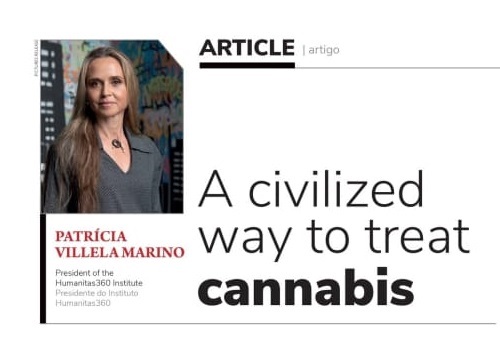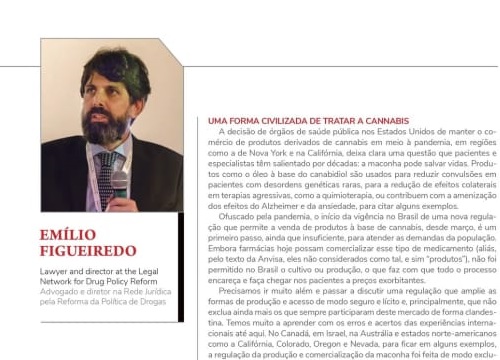A civilized way to treat cannabis
Originally published at Economy & Law, June 2020.
Patrícia Villela Marino and Emílio Figueiredo
The decision by public health agencies in the United States to keep cannabis-derived products trade in the midst of the pandemic in regions such as New York and California sheds light to an issue that patients and experts have highlighted for decades: marijuana can save lives. Products such as cannabidiol-based oil are used to reduce seizures in patients with rare genetic disorders, to reduce side effects in aggressive therapies, such as chemotherapy, and to mitigate the effects of Alzheimer’s and anxiety, to name a few examples.
Obfuscated by the pandemic, a new regulation approved in March in Brazil allows the sale of cannabis-based products. It is a first step, albeit insufficient, to meet the demands of the population. Although drugstores today can sell this type of medication (by the way, according to Anvisa’s text, they are not considered “medications”, but “products”), farming and production are not allowed in Brazil, which makes the whole process more expansive and products get to patients at exorbitant prices.
We need to go much further and start to discuss a regulation that expands the forms of production and access in a safe and lawful manner and, above all, without further excluding those who have always participated in this market in a clandestine manner. We have much to learn from the mistakes and successes of international experiences. In Canada, Israel, Australia and US states such as California, Colorado, Oregon and Nevada, to name a few, the regulation of marijuana production and trade have been on an exclusive basis.
In these countries, regulation was designed for the benefit of wealthy and white businessmen – something that can be seen, for example, with the proliferation of private funds to finance cannabis initiatives – a market that passed the mark of legal sales from US $ 6.5 billion in 2016 to $ 10.3 billion in 2018, according to New Frontier Data research. There is a policy that excludes communities that have for years been affected by a wrongful policy. This is evident when analyzing mass incarceration data – a phenomenon that is not restricted to the United States. Of all crimes, drug trafficking incarcerates the most. In 2018, of every 10 people arrested for drugs in the United States, 4 were convicted for possession of marijuana, according to the Pew Research Center.
We are following the same path. In Brazil, more than 200,000 people are in prison for drug-related crimes – among women, this type of crime accounts for more than half of all convictions, according to the latest national penitentiary information survey by the National Penitentiary Department, using data as recent as December 2019. According to a study by the Public Agency that analyzed 4,000 trafficking convictions in the city of Sao Paulo in 2017, blacks are convicted in a greater proportion than whites (70.9%, against 66.8%) and in possession of lesser amounts of the drug . To be imprisoned, it is enough for black people to be, on average, in possession of 136g of marijuana – while whites only go to prison with about 482g.
Taking into account the history of oppressed marginalized populations and the black community is one of the aspects that needs to be highlighted in order to seriously discuss the regulatory scenario of the cannabis market in Brazil. Why not have a dialogue on ethics and cannabis? What are the appropriate principles and values in this new regulation? How will the historical reparation of the damages suffered by people and communities with violence be carried out? What will the State’s participation be like, in addition to regulating and supervising? How will cannabis be inserted into SUS (Brazil´s public healthcare system)?
A special commission in Congress has researched and debated regulatory models in other countries. Looking at the experiences of countries like Colombia and Uruguay is fundamental, but we must build a Brazilian model that serves to generate jobs and opportunity for the people most affected by the ban. And it is known today that cannabis cultivation can be tracked – meaning that there is enough technology to refute the obvious argument of illegality.
It is time to revisit the origins of our discussions on this subject and to have as main benchmarks the parents who for many years have been fighting for the right to access these medicines for the well-being of their children. Not to mention the victims of violence who have for so many years been fighting against a blind and ineffective “war on drugs”.
There are over 60 habeas corpus granted to families to grow cannabis at home to make their own medicine under the guidance of doctors and other professionals. There is also an association in Paraíba – Abrace – authorized by court order to grow and distribute medicines to its members across the country. Dozens of other associations are also fighting for this right.
It is time for institutions to engage in dialogue between various social actors, especially among those affected by the harmful effects of the ban, and to seek a debate for a regulatory framework creation that expands the forms of access and ensures inclusion. Unfortunately, the conservative and prejudiced context on the part of our leaders still clouds a great prospect of health innovation in the 21st century.
Patrícia Villela Marino is president of the Humanitas360 Institute
Emílio Figueiredo is a lawyer and director at the Legal Network for Drug Policy Reform
To read the article for free, please download the app Winners Prime Leaders Magazine (Android or IOS)


